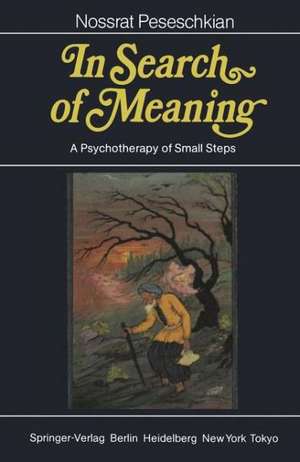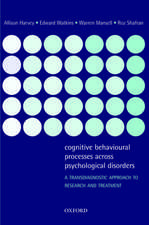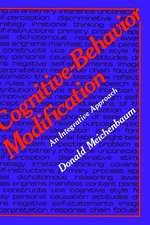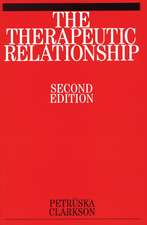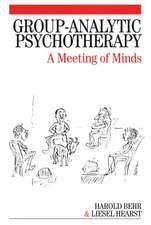In Search of Meaning: A Psychotherapy of Small Steps
Autor Nossrat Peseschkianen Limba Engleză Paperback – noi 1985
Many authors shy away from religious definitions of human purpose. But Nossrat Peseschkian, who shares with me the Baha'i perspective of purpose, clearly shows how the quest to unite a soul with its God serves and is served by scientific and cultural perspectives of meaning. Spiritual verities become beacons to guide us to find ways to work together and create new dimen sions for consultation in the making of decisions. Depression is rife today. We often do not feel that we are in charge of our own lives, and feel impotent to influence the destiny of society. Peseschkian brings us a positive approach. He provides a key for us to discover the relationship between our various capacities and their development. For so many of us, our capacities lie unused, often even unrecognized. This book seeks to answer the question «How can I use my capacities?" and to demonstrate practically and specifically how science, politics, religion, and the web of human relationships can assist in their development and use. Balance is the key: the balance betwen various aspects of our life, the balance of our modes of learning and thinking and feeling, the balance in our concept of man and his purpose, the balance found in the lessons of the past and the vision of the future, and the balance which defines our responsibility for our personal and our societal destinies.
Preț: 708.23 lei
Preț vechi: 745.50 lei
-5% Nou
135.52€ • 144.92$ • 112.99£
Carte tipărită la comandă
Livrare economică 18 aprilie-02 mai
Specificații
ISBN-10: 3540157662
Pagini: 220
Ilustrații: XIV, 206 p.
Dimensiuni: 133 x 203 x 12 mm
Greutate: 0.23 kg
Ediția:Softcover reprint of the original 1st ed. 1985
Editura: Springer Berlin, Heidelberg
Colecția Springer
Locul publicării:Berlin, Heidelberg, Germany
Public țintă
ResearchCuprins
1: Meaning and Man.- 1. Meaninglessness as an Expression of One-Sidedness.- Meaning and loss of unity.- Hope and helplessness.- Child rearing: therapy and the question of meaning.- Social changes and the view of mankind.- Consequences.- 2. The Meaning of Health.- «The broken bowl».- Bodily health.- Career, family, marriage.- Future and meaning.- Body, environment, time.- Risk factors.- The body-soul problem (psychosomatics).- Meaning and psychosomatic relationships.- Three examples.- Consequences.- 3. Positive Psychotherapy: Answer to the Question of Meaning.- An example of positive procedure.- Good questions.- «The duel of the physicians».- Psychotherapy instead of psychopathology.- The development of positive.- psychotherapy.- Child rearing.- Self-help.- Psychotherapy.- Transcultural problematic.- What is this book leading up to?.- Consequences.- 2: Giving Meaning And Finding Meaning.- 1. Transcultural Encounters.- «Knowledge is power, sight is omnipotence».- Foreign laborers as a necessary evil.- Why psychotherapy must be transcultural.- Basic capacities.- «Meaning of commonality».- What is the capacity to love?.- What is the capacity to know?.- Development of the basic and actual capacities.- Man is good.- Basic capacities in the literature.- Consequences.- 2. Concepts of the Religious Worldview.- «Appropriate prayer».- Dangerous tea.- Religion as giving meaning.- Religion and Zeitgeist.- Faith, religion, church.- Religion and psychology.- Consequences.- 3. The Contribution of Scientific Thinking.- «Believe in God and tie your camel securely».- Science as finding meaning.- The omnipotence of reason (science without religion).- The meaning of the capacity to know.- Religion in science.- Zeitgeist and psychopathology.- The atomic threat.- Scientists vs founders of religions.- Consequences.- 4. The Life of the Individual.- «Don’t forget who you were!».- Can everyone be happy in his own fashion?.- The three pillars of Positive Psychotheraypy.- A. The positive approach.- B. The contents approach.- Microtrauma theory.- Four ways of coping with conflicts.- Modes of the capacity to love.- C. Five stags of self-help.- Consequences.- 3: Psychotherapy of Small Steps.- 1. Three working Possibilities of Positive Psychotherapy.- «The eager spectators and the elephant».- Body, soul, spirit.- Three possible approaches: body, environment, time.- Present, future, and past.- Consequences.- 2. Meaning in East and West.- «One roof garden and two worlds».- East-West concepts: on the quest for meaning.- Marriage, family.- Life, death, future.- Primary capacities.- Secondary capacities.- Examples of medical terms and some views of illness.- Practice: for example, on the question of leaving one’s parents.- East-West concepts in politics.- Transcultural aspects in the understanding of individual conflicts.- Consequences.- 3. The Meaning of Illness.- «An optimist».- What does Positive Psychotherapy mean?.- Translation of conventional illness terminology.- Practical application of the «positive translation».- Positive procedure in the therapeutic process.- Traditional interpretation/Positive interpretation: Adiposity.- Alcoholism.- Ambivalent attitude.- Fear of attachment.- Fear of loneliness.- Fear of groups.- Anorexia nervosa.- Bronchial asthma.- Bedwetting.- Depression.- Jealousy.- Irritability.- Exhibitionism.- Existential anxiety.- Delayed ejaculation.- Precocious ejaculation.- Laziness.- Fetishism.- Fixation.- Inhibition.- Heart attack.- Compulsive neurosis.- Aggressivity.- Frigidity.- Hypertonicity.- Homosexuality.- Hypochondria.- Hysteria.- Kleptomania.- Criminality.- Paranoia.- Phobia.- Impotence.- Psychosomatic symptoms.- Mania.- Masochism.- Masturbation.- Narcissism.- Rheumatism (abdominal).- Rivalry (sibling).- Sadism.- Schizophrenia.- Vertigo.- Stress.- Stomach ulcers.- Disobedience, insolence.- Attention-getting behavior of children.- Self-neglect.- Change of life.- Positive aspects of loneliness.- Consequences.- 4. Five Stages in Positive Psychotherapy.- «Easy cure».- Psychotherapy, self-help.- Stage One: observation/distancing.- «Two hedgehogs».- Stage Two: making an inventory.- «Peacock’s feet».- Application of the four ways of coping with conflict.- Stage Three: situational encouragement.- «Beautiful antlers».- Relativity of values.- Stage Four: verbalization.- «How does a war start?».- Partner group, family group.- Stage Five: broadening of goals.- «The successful merchant».- Crisis as opportunity.- Application of the five stages.- Therapy.- Consequences.- 4: Questions of Meaning.- Many questions, many answers.- «The appropriate word».- Child rearing and psychotherapy.- Psychological meaning of time.- What do you understand by basic capacities?.- Is man essentially good?.- Where are the basic capacities found?.- What are the functions of the actual capacities?.- How do you as a psychotherapist stand in relation to sexuality?.- What does child rearing consist of in terms of contents?.- How are love and justice related?.- What is the relationship between anxiety, aggression, and imitation?.- Can one get something back that one has let slip away?.- Good intentions.- The unknown.- Man and wife.- What does faith have to do with psychotherapy?.- What do all the religions have in common?.- Seven attributes.- From the point of view of psychology, how do prejudices arise?.- Religion and well-known personalities why do the learned and the religious leaders speak so harshly of a new religion? What explanations are there for the existence of a Creator?.- Why can’t one know the essence of God?.- Religion and existential anxiety.- Isn’t everything over with death?.- Reincarnation.- What do the scientists say about life after death?.- 5: The Golden age of the Future.- «End or dawn?».- Planned future.- Future made to order?.- Suggestions and considerations concerning world peace.- The contribution of the politicians to the transcultural encounter.- The contribution of the religious leaders.- The contribution of the scientists.- The contribution of the individual.- «The dream and its meaning».- Index of stories.
Descriere
Many authors shy away from religious definitions of human purpose. But Nossrat Peseschkian, who shares with me the Baha'i perspective of purpose, clearly shows how the quest to unite a soul with its God serves and is served by scientific and cultural perspectives of meaning. Spiritual verities become beacons to guide us to find ways to work together and create new dimen sions for consultation in the making of decisions. Depression is rife today. We often do not feel that we are in charge of our own lives, and feel impotent to influence the destiny of society. Peseschkian brings us a positive approach. He provides a key for us to discover the relationship between our various capacities and their development. For so many of us, our capacities lie unused, often even unrecognized. This book seeks to answer the question «How can I use my capacities?" and to demonstrate practically and specifically how science, politics, religion, and the web of human relationships can assist in their development and use. Balance is the key: the balance betwen various aspects of our life, the balance of our modes of learning and thinking and feeling, the balance in our concept of man and his purpose, the balance found in the lessons of the past and the vision of the future, and the balance which defines our responsibility for our personal and our societal destinies.
